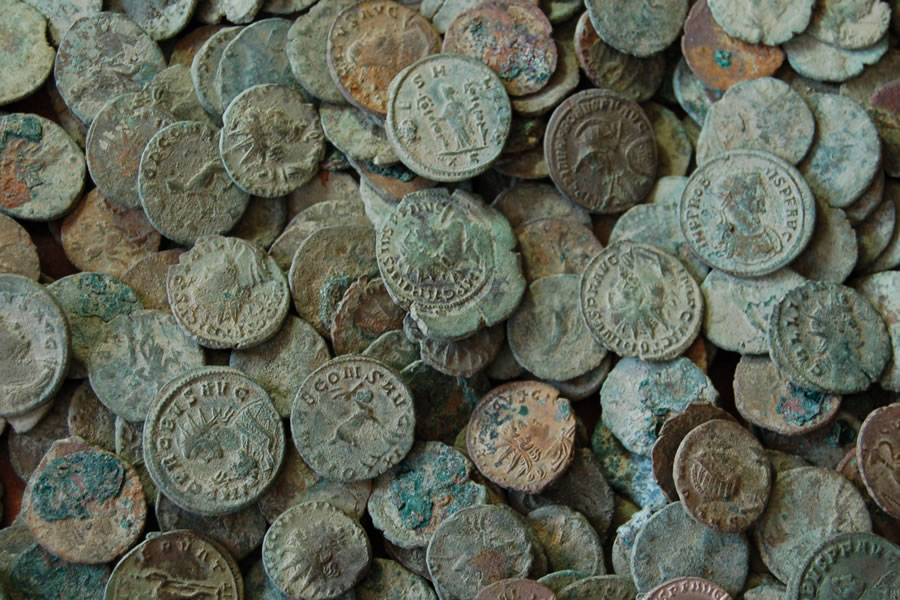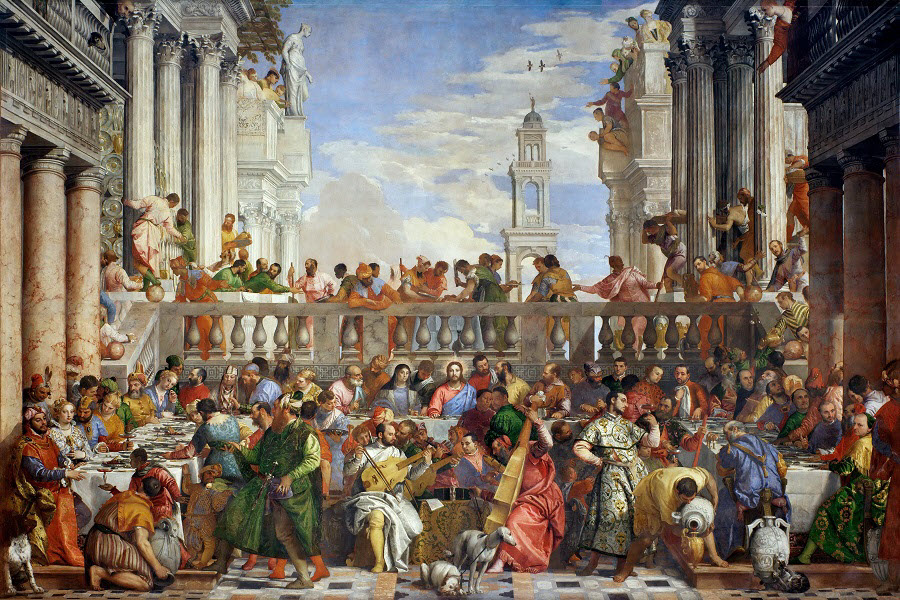St. Francis of Assisi Weekly Reflections
Love Of Neighbor
10-29-2023Question of the WeekReading I: Exodus 22:20-26 - Social laws
Reading II: 1 Thessalonians 1:5c-10 - A model for believers
Gospel: Matthew 22:34-40 - The greatest commandment
Key Passage: Jesus replied: “Love the Lord your God with all your heart and with all your soul and with all your mind.” This is the first and greatest commandment. The second is like it: You shall love your neighbor as yourself. (Matthew 22:36-40)
Adults: In a practical sense, what is one thing that would change in your life if you loved your neighbor as yourself?
Kids: Why is it hard sometimes to love your neighbor?
Amor Al Projimo
Lectura I: Éxodo 22:20-26 - Leyes sociales
Lectura II: 1 Tesalonicenses 1:5c-10 - Un modelo para los creyentes
Evangelio: Mateo 22:34-40 - El mandamiento más grande
Pasaje Clave: Jesús respondió: “Ama al Señor tu Dios con todo tu corazón y con toda tu alma y con toda tu mente”. Este es el primer y mayor mandamiento. Y el segundo es semejante a este: Amarás a tu prójimo como a ti mismo. (Mateo 22:36-40)
Adultos: En un sentido práctico, ¿qué cosa cambiaría en tu vida si amaras a tu prójimo como a ti mismo?
Niños:¿Por qué a veces es difícil amar al prójimo?

You Shall Love The Lord, Your God, With All Your Heart
10-29-2023Weekly ReflectionWe Celebrate Worship Resource, Vol. 48, No. 3Wouldn’t it be wonderful to take a class where the teacher reveals that everything we need to know can be summarized in just two sentences? What an easy final exam that would be! In today’s Gospel, Jesus, our Teacher, does just that, telling the Pharisees—sticklers for all 613 commandments written in the Torah—that all of the law and the prophets depends on just two commandments: “You shall love the Lord, your God, with all your heart, with all your soul, and with all your mind” and “You shall love your neighbor as yourself” (Matthew 22:37, 39). He’s right, of course. If you love God and your neighbor this way, you will want to follow every other command that can be found in either Testament, Old or New. As long as we keep in mind that we all are made in the image and likeness of God, that Jesus chose to redeem us all, and that the Holy Spirit dwells within us all, then we will want to love God and our neighbor with all our strength, for in loving one we are loving both. Jesus gave us the answer and a model. Let us, as Paul says, be imitators of the Lord.
When have you found it difficult to recognize God’s presence in your neighbor? How can you overcome this?
Amarás Al Senor, Tu Dios, Con Todo Tu Corazón
¿No sería maravilloso tomar una clase donde el profesor revele que todo lo que necesitamos saber se puede resumir en sólo dos oraciones? ¡Qué examen final más fácil sería ese! En el Evangelio de hoy, Jesús, nuestro Maestro, hace precisamente eso, dice a los fariseos— rigurosos con los 613 mandamientos escritos en la Torá—que toda la ley y los profetas dependen de sólo dos mandamientos: “Amarás al Señor, tu Dios, con todo tu corazón, con toda tu alma y con toda tu mente” y “Amarás a tu prójimo como a ti mismo” (Mateo 22:37, 39). Tiene razón, por supuesto. Si amas a Dios y a tu prójimo de esta manera, querrás seguir todos los demás mandamientos que se pueden encontrar en el Testamento, ya sea el Antiguo o el Nuevo. Mientras tengamos presente que todos estamos hechos a imagen y semejanza de Dios, que Jesús eligió redimirnos a todos y que el Espíritu Santo habita en todos nosotros, entonces querremos amar a Dios y a nuestro prójimo con toda nuestra fuerza, porque al amar a uno estamos amando a ambos. Jesús nos dio la respuesta y un modelo. Seamos, como dice Pablo, imitadores del Señor.
¿Cuándo te ha resultado difícil reconocer la presencia de Dios en tu prójimo? ¿Cómo puedes superar esto?
Social Responsibility
10-22-2023Question of the WeekReading I: Isaiah 45:1, 4-6 - Rewards to Cyrus, king of Persia
Reading II: 1 Thessalonians 1:1-5b - A model for believers
Gospel: Matthew 22:15-21 - Paying tax to the emperor
Key Passage: At that [Jesus] said to them “Repay to Caesar what belongs to Caesar, and to God what belongs to God.” (Matthew 22:21)
Adults: How much responsibility do you feel the government should take for meeting the needs of the less fortunate in our society? How willing are you to contribute?
Kids: Who needs help in your neighborhood or community? What could you and your family do to help?
Responsabilidad Social
Lectura I: Isaías 45:1, 4-6 - Recompensas a Ciro, rey de Persia
Lectura II: 1 Tesalonicenses 1:1-5b - Un modelo para los creyentes
Evangelio: Mateo 22:15-21 - Pagar impuestos al emperador
Pasaje Clave: Jesús concluyó: “Den, pues, al César lo que es de César, y a Dios lo que es de Dios”. (Mateo 22:21)
Adultos: ¿Cuánta responsabilidad cree que debería asumir el gobierno para satisfacer las necesidades de los menos afortunados en nuestra sociedad? ¿Qué tan dispuesto estás a contribuir?
Niños: ¿Quién necesita ayuda en su vecindario o comunidad? ¿Qué podrían hacer usted y su familia para ayudar?

Repay To Caesar What Belongs To Caesar...
10-22-2023Weekly ReflectionWe Celebrate Worship Resource, Vol. 48, No. 3“Then repay to Caesar what belongs to Caesar and to God what belongs to God,” Jesus tells his questioners in today’s Gospel, avoiding the trap they had hoped to snare him in (Matthew 22:21). By responding this way Jesus is recognizing that Jewish people have civic obligations that they must honor, even if they oppose the regime that rules over them. They can do this while still worshiping and obeying God. However, God is not repaid in the same way as the state. God does not collect income taxes from us every April 15. There is no divine equivalent to a sales tax or property tax. But what if we thought of the grace we receive from God as something we should repay? How do we repay God for our talents, our life, our redemption? How do we repay God for all that others do for us in God’s name—their service, their assistance, and their prayers? Do we overlook these occasions of grace and fail to realize their ultimate source? In the week ahead, every time we “repay to Caesar” let us consider how God has provided for us and repay God with our gratitude, our sacrifice, and our resolve to extend God’s grace to others.
What can you do today to repay God for what your receive?
Dad A César Lo Que Es Del César...
Dad al César lo que es del César y a Dios lo que es de Dios”, les dice Jesús a sus interlocutores en el Evangelio de hoy, evitando la trampa que le tendieron (Mateo 22:21). Al responder de esta manera Jesús está reconociendo que el pueblo judío tiene obligaciones cívicas que debe honrar, incluso si se oponen al régimen que lo gobierna. Pueden hacer esto sin dejar de adorar y obedecer a Dios. Sin embargo, Dios no recibe la misma recompensa que el Estado. Dios no nos cobra impuestos sobre la renta cada 15 de abril. No existe un equivalente divino a un impuesto sobre las ventas o un impuesto a la propiedad. Pero ¿qué pasaría si pensáramos en la gracia que recibimos de Dios como algo que debemos pagar? ¿Cómo le pagamos a Dios por nuestros talentos, nuestra vida, nuestra redención? ¿Cómo le pagamos a Dios por todo lo que otros hacen por nosotros en su nombre: su servicio, su asistencia y sus oraciones? ¿Pasamos por alto estas ocasiones de gracia y no nos damos cuenta de su fuente última? En la próxima semana, cada vez que “paguemos al César”, consideremos cómo Dios nos ha provisto y paguemos a Dios con nuestra gratitud, nuestro sacrificio y nuestra resolución de extender la gracia de Dios a los demás.
¿Qué puedes hacer hoy para pagarle a Dios por lo que recibes?

Are You Ready for the Feast?
10-15-2023Weekly ReflectionWe Celebrate Worship Resource, Vol. 48, No. 3In the parable in today’s Gospel, Jesus liken the kingdom of heaven to a wedding banquet given by a king (God) for his son (Jesus) - to celebrate the marriage of heaven and earth, if you will. Prophets from Isaiah to John have called the people to repent, to properly prepare themselves for the feast. But many ignored them. Worse, some attacked those who spoke on God’s behalf. In the end, everyone is invited, worthy and unworthy alike, for God’s invitation—and, later, Jesus’ redemption—is offered to everyone. Still, not everyone prepared themselves for this marriage of heaven and earth, for the kingdom of God. They chose not to repent or observe all that God has commanded and Jesus has taught. So they were cast into the darkness while the chosen enjoyed the eternal light of God’s presence. One remarkable aspect of this parable is the persistence of the king. Again and again, even after vehement rejection, he repeated his invitation. In fact, the farmer and the businessman who initially ignored it were probably invited again when the servants gathered all they could find. No matter how we’ve responded in the past, let us listen for God’s persistent invitation today and choose to prepare ourselves for the feast.
What must you change about yourself or your behavior in order to be properly prepared for the kingdom of heaven?
¿Y Tú, Estas Listo Para La Fiesta?
En la parábola del Evangelio de hoy, Jesús comparó el reino de los cielos con un banquete de bodas ofrecido por un rey (Dios) para su hijo (Jesús), para celebrar las bodas del cielo y la tierra, por así decirlo. Los profetas, desde Isaías hasta Juan, han llamado al pueblo al arrepentimiento y a prepararse adecuadamente para la fiesta. Pero muchos los ignoraron. Peor aún, algunos atacaron a quienes hablaban en nombre de Dios. Al final, todos están invitados, dignos e indignos por igual, porque la invitación de Dios (y, más tarde, la redención de Jesús) se ofrece a todos. Aún así, no todos se prepararon para este matrimonio del cielo y la tierra, para el reino de Dios. Eligieron no arrepentirse ni observar todo lo que Dios ha mandado y Jesús ha enseñado. Así que fueron arrojados a la oscuridad mientras los elegidos disfrutaban de la luz eterna de la presencia de Dios. Un aspecto notable de esta parábola es la persistencia del rey. Una y otra vez, incluso después del vehemente rechazo, repitió su invitación. De hecho, el granjero y el empresario que inicialmente lo ignoraron probablemente fueron invitados nuevamente cuando los sirvientes reunieron todo lo que pudieron encontrar. No importa cómo hayamos respondido en el pasado, escuchemos hoy la persistente invitación de Dios y elijamos prepararnos para la fiesta.
¿Qué debes cambiar en ti mismo o en tu comportamiento para estar preparado adecuadamente para el reino de los cielos?
Living Our Faith
10-15-2023Question of the WeekReading I: Isaiah 25:6-10 - A feast for all peoples
Reading II: Philippians 4:12-14, 19-20 - Generosity
Gospel: Matthew 22:1-14 - The wedding banquet
Key Passage: Jesus said, “Many are invited, but few are chosen.” (Matthew 22:14)
Adults: How do you translate your faith into the work of the Reign of God?
Kids: What three things can you do this week to show that you are a follower of Jesus?
Viviendo Nuestra Fe
Lectura I: Isaías 25,6-10 - Una fiesta para todos los pueblos
Lectura II Filipenses 4:12-14, 19-20 - Generosidad
Evangelio Mateo 22:1-14 - El banquete de bodas
Pasaje Clave: Jesús dijo: “Muchos son los llamados, pero pocos los escogidos”. (Mateo 22:14)
Adultos: ¿Cómo transformas tu fe en obra del Reino de Dios?
Niños: ¿Qué tres cosas puedes hacer esta semana para demostrar que eres un seguidor de Jesús?

Bearing Fruits For God
10-08-2023Weekly ReflectionWe Celebrate Worship Resource, Vol. 48, No. 3Today we hear Jesus tell a parable of a landowner who takes tender loving care of his vineyard. He tends it, protects it, and watches over it, much as the vineyard owner in Isaiah’s parable does. But at harvesttime his tenants assault those he sends to collect the harvest, even his own son. Jesus must realize how closely this parable will resonate with his own life. He asks the chiefs and the elders what the landowner will do to these tenants. They reply, “He will put those wretched men to a wretched death and lease his vineyard to other tenants who will give him the produce at the proper times” (Matthew 21:41). They are sooo close. They realize these tenants deserve punishment. They know the vineyard needs a proper harvest. But they're missing an essential part. As Jesus will soon say from the cross, “Father, forgive them, they know not what they do” (Luke 23:34). The blood shed in the parable becomes redemptive on the cross. The son rejected by the tenants becomes the cornerstone of our faith. The vineyard—that is, our world and all who are in it—is now entrusted to us. We must give it the tender loving care God desires, so we can produce fruit for God’s kingdom.
What will you do that will bear fruit for others and for God?
Dando Frutos Para Dios
Hoy escuchamos a Jesús contar la parábola de un terrateniente que cuida con ternura y amor su viña. Él la cuida, la protege y la vigila, como lo hace el dueño de la viña en la parábola de Isaías. Pero en el tiempo de la cosecha, sus inquilinos atacaron a quienes envíaron a recoger la cosecha, incluso a su propio hijo. Jesús debe darse cuenta de cuán estrechamente resonará esta parábola con su propia vida. Pregunta a los jefes y a los ancianos qué hará el terrateniente con estos inquilinos. Ellos responden: “Él dará una muerte miserable a esos desdichados y arrendará su viña a otros labradores que le darán el producto a su debido tiempo” (Mateo 21:41). Están muy cerca. Se dan cuenta de que estos inquilinos merecen un castigo. Saben que el viñedo necesita una cosecha adecuada. Pero les falta una parte esencial. Como Jesús pronto dirá desde la cruz: “Padre, perdónalos porque no saben lo que hacen” (Lucas 23:34). La sangre derramada en la parábola se vuelve redentora en la cruz. El hijo rechazado por los inquilinos se convierte en la piedra angular de nuestra fe. La viña, es decir, nuestro mundo y todos los que en él están, ahora nos ha sido confiada. Debemos darle el cuidado tierno y amoroso que Dios desea, para que podamos producir frutos para el reino de Dios.
¿Qué harás que dé frutos para los demás y para Dios?
Dealing With Injustice
10-08-2023Question of the WeekReading I: Isaiah 5:1-7 - The vineyard song
Reading II: Philippians 4:6-9 - Joy and peace in Christ
Gospel: Matthew 21:33-43 - Parable of the tenants
Key Passage: Jesus said, “Therefore I say to you, the kingdom of God will be taken away from you and given to a people that will produce its fruit.” (Matthew 21:43)
Adults: How have you used your talents and abilities well for the Reign of God?
Kids: What can you do in your week to help the love of God grow in the world?
Enfrentando La Injusticia
Lectura I: Isaías 5:1-7 - El canto de la viña
Lectura II: Filipenses 4:6-9 - Alegría y paz en Cristo
Evangelio: Mateo 21:33-43 - Parábola de los labradores
Pasaje Clave: Jesús dijo: “Por esta razón les digo a ustedes que les será quitado el Reino de Dios y se le dará a un pueblo que produzca sus frutos”. (Mateo 21:43)
Adultos: ¿Cómo han utilizado bien sus talentos y habilidades para el Reino de Dios?
Niños: ¿Qué puedes hacer en tu semana para ayudar a que el amor de Dios crezca en el mundo?
The Challenge to Forgive
10-01-2023Question of the WeekReading I: Ezekiel 18:25-28 - Personal responsibility
Reading II: Philippians 2:1-11 - Imitating the humility of Christ
Gospel: Matthew 21:28-32 - Parable of the two sons
Key Passage: A man had two sons; he went to the first and said, “Son, go and work in the vineyard today.” He answered, “I will not”; but later he changed his mind and went. The father went to the second and said the same; and he answered, “I go, sir”; but he did not go. Which of the two did the will of his father? They said, “The first.” (Matthew 21:28–31)
Adults: When have your actions not measured up to your promises? What was the outcome?
Kids: Why is it important to follow through on your promises to others?
El Reto De Perdonar
Lectura I: Ezequiel 18:25-28 - Responsabilidad personal
Lectura II: Filipenses 2:1-11 - Imitando la humildad de Cristo
Evangelio: Mateo 21:28-32 - Parábola de los dos hijos
Pasaje Clave Un hombre tenía dos hijos, y le dijo a uno de ellos: “Hijo, ve hoy a trabajar a mi viñedo.” El hijo le contestó: “¡No quiero ir!” Pero después cambió de parecer, y fue. Luego el padre se dirigió al otro, y le dijo lo mismo. Éste contestó: “Sí, señor, yo iré.” Pero no fue. ¿Cuál de los dos hizo lo que su padre quería? Ellos le respondieron “El primero”. (Mateo 21:28–31)
Adultos: ¿Cuándo tus acciones no han estado a la altura de tus promesas? ¿Cuál fue el resultado?
Niños: ¿Por qué es importante cumplir las promesas a los demás?

Which Of The Two Did His Father’s Will?
10-01-2023Weekly ReflectionWe Celebrate Worship Resource, Vol. 48, No. 3In today’s Gospel, two brothers are asked to work in the vineyard. One responds defiantly and the other obediently. But the defiant son changes his mind and ends up doing what his father asked. Perhaps spurred by guilt, perhaps by a moral epiphany, he has a change of heart and obeys. The other son does the exact opposite. Whether he only said yes to get his father off his back or later decided he had better things to do, he does not comply. The chief priests immediately identify the first son as the obedient one, recognizing that actions speak louder than words. But they condemn themselves in the process, for—unlike tax collectors and prostitutes—they fail to put Jesus’ call to repentance into action. Every day, Jesus calls us to repentance, for every day we struggle with our choices. Let us not take refuge in hollow words and then do whatever we want. Rather, let us search our consciences for our sinfulness, root it out, and put God’s will into action. As Ezekiel points out, it is never too late to turn away from sin.
When have you struggled to put your words into action?
¿Cuál De Los Dos Hizo La Voluntad Del Padre?
En el evangelio de hoy se pide a dos hermanos que trabajen en la viña. Uno responde desafiante y el otro obediente. Pero el hijo desafiante cambia de opinión y acaba haciendo lo que le pidió su padre. Quizás impulsado por la culpa, quizás por una epifanía moral, cambia de opinión y obedece. El otro hijo hace exactamente lo contrario. Ya sea que solo haya dicho que sí para quitarse de encima a su padre o que luego haya decidido que tenía mejores cosas que hacer, no cumple. Los principales sacerdotes inmediatamente identifican al primer hijo como el obediente, reconociendo que las acciones hablan más que las palabras. Pero se condenan a sí mismos en el proceso porque, a diferencia de los recaudadores de impuestos y las prostitutas, no ponen en práctica el llamado de Jesús al arrepentimiento. Cada día, Jesús nos llama al arrepentimiento, porque cada día luchamos con nuestras decisiones. No nos refugiemos en palabras huecas y luego hagamos lo que queramos. Más bien, busquemos en nuestra conciencia nuestra pecaminosidad, erradiquémosla y pongamos en práctica la voluntad de Dios. Como señala Ezequiel, nunca es demasiado tarde para alejarse del pecado.
¿Cuándo te ha costado poner tus palabras en acción?